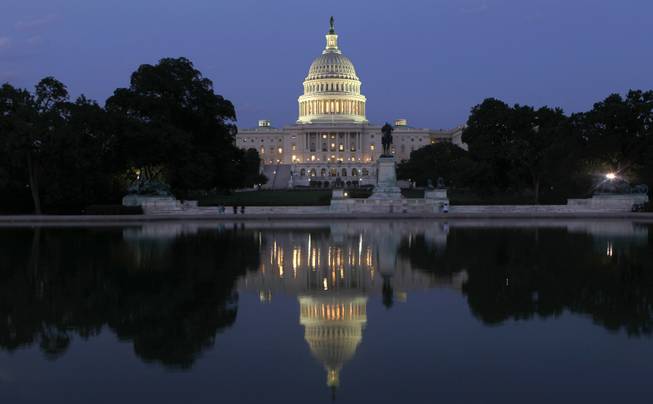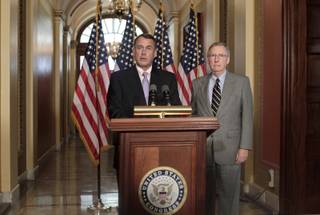
J. Scott Applewhite / AP
The U.S. Capitol in Washington is illuminated as the debt-limit stalemate continues Saturday night, July 30, 2011.
Saturday, July 30, 2011 | 10:26 p.m.
Sun archives
- Reid calls McConnell out for exaggerating his influence in deal (7-30-2011)
- Most Senate Republicans rallying against Reid’s option (7-30-2011)
- Both sides agree default would be bad news for Nevadans (7-30-2011)
- Democrats’ rising stars may split key voting blocs (7-30-2011)
- Debt votes accompanied by political posturing (7-29-2011)
- Senate rejects House-approved debt bill without any debate on merits (7-29-2011)
- Debt-limit votes could go to the wire (7-29-2011)
- McConnell-Reid making up could be key in weekend debt talks (7-29-2011)
- House inaction on debt strengthens Harry Reid's bargaining position (7-29-2011)
- Debt crisis: Deal sought in Washington to head off stock plunge (7-23-2011)
- Lots of private talks, but still no deal, on debt ceiling (7-21-2011)
- Boehner: House will compromise on debt limit (7-21-2011)
- Reid sends signal he won’t back compromise bill based on budget cuts (7-21-2011)
After a day of pushing the Senate toward a wee-hours vote on his plan to raise the debt ceiling, Senate Majority Leader Harry Reid hit the legislative pause button late Saturday night to allow the White House and Republican leaders more time to ink a compromise deal they’re apparently close to reaching.
“I’m glad to see this move toward cooperation and compromise. I hope it bears fruit,” Reid said on the floor, announcing he had pushed the Senate’s vote back from 1 a.m. to 1 p.m. Sunday.
“I’m confident they can reach an agreement...and I believe we should give them time to do so,” he said.
Senate Minority Leader Mitch McConnell had insisted Saturday that compromise talks had to take place with President Barack Obama.
“If the president decides to reach an agreement, the rest of the Democrats will fall in line,” he said. “We are fully engaged with the one person in America, the one in 307 million, that can sign this bill into law.”
Earlier Saturday evening, Reid chastised McConnell for overstating his influence with the White House and the nearness of a deal.
He made no apology for any of that as he wished the president and GOP leaders well in their final push.
When asked how he felt about being on the sidelines, Reid said he’d be happy if the negotiators “get something reasonable to avert this crisis.”
When asked if he thought the negotiators would be successful, Reid said, “I sure hope so.”
The president and vice president appear to have been engaged in a sort of telephonic shuttle diplomacy with a small group of GOP leaders throughout the day. The process is sure to continue through the night if they plan to strike a deal by about noon Sunday.
The deal that’s emerging hinges on a “trigger” mechanism to ensure future fiscal sobriety and fairness.
There’s no question the deal will give Obama the debt limit increase through 2012 he’s been demanding. Anything short of that and he’d have walked away from the table by now.
Lawmakers were speaking Saturday about other particulars that seem destined to be part of an agreement: a vote on a balanced budget amendment; a bipartisan commission to recommend long-term cuts past the initial $1 trillion or so that would be cut from discretionary spending; and sequestration — an order that if Congress fails to agree on longer-term reductions, more painful across-the-board reductions would take effect automatically.
It’s that last bit that’s the kicker.
The dangling hammer of deep and instant cuts might appeal to Republicans as a useful tool to compel compromise. But Democrats have resisted the idea of across-the-board cuts if there isn’t also the threat of across-the-board revenue increases.
News reports, meanwhile, suggested the president was not planning to protect programs like Social Security and Medicare from sharing the burden of a chop.
That may not sit well with Democrats.
The president has taken a more conservative stand than the bulk of the Democratic caucus when it comes addressing changes and cuts to entitlement programs.
It’s not a radical split, but it’s enough to have shaken the Democratic caucus a few weeks ago when intense debt talks were just getting under way and the president said he’d be willing to deal.
This time, that debate wouldn’t be about making cuts to social spending. Because it’s happening in the context of hammering out a sequestration procedure, it’s only about threatening such cuts — they never kick in if Congress reaches a compromise on long-term cuts and revenues.
But even putting the subject on the table as a potential inevitability might be too much for some Democrats, who would then have to choose between principle and, as McConnell said, falling in line behind the president.
McConnell appeared to be in exceptionally good spirits leaving the Capitol late Saturday night.
The Democratic leaders who remained in the Capitol in far greater numbers seemed less at ease as they trickled away.
Democratic Sen. Kent Conrad, the Budget Committee chairman and Gang of Six ringleader, was one of the last to leave.
When asked if he had faith in the president’s ability to carry a favorable negotiation across the finish line without the help of Senate Democrats, he put his answer succinctly.
“Well, at the end of the day, we get to vote,” he said.



Join the Discussion:
Check this out for a full explanation of our conversion to the LiveFyre commenting system and instructions on how to sign up for an account.
Full comments policy